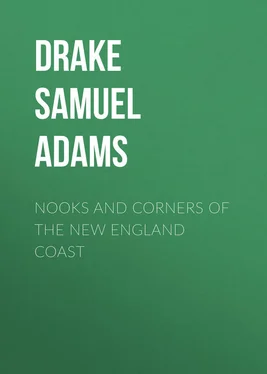Samuel Drake - Nooks and Corners of the New England Coast
Здесь есть возможность читать онлайн «Samuel Drake - Nooks and Corners of the New England Coast» — ознакомительный отрывок электронной книги совершенно бесплатно, а после прочтения отрывка купить полную версию. В некоторых случаях можно слушать аудио, скачать через торрент в формате fb2 и присутствует краткое содержание. Жанр: foreign_antique, foreign_prose, на английском языке. Описание произведения, (предисловие) а так же отзывы посетителей доступны на портале библиотеки ЛибКат.
- Название:Nooks and Corners of the New England Coast
- Автор:
- Жанр:
- Год:неизвестен
- ISBN:нет данных
- Рейтинг книги:3 / 5. Голосов: 1
-
Избранное:Добавить в избранное
- Отзывы:
-
Ваша оценка:
- 60
- 1
- 2
- 3
- 4
- 5
Nooks and Corners of the New England Coast: краткое содержание, описание и аннотация
Предлагаем к чтению аннотацию, описание, краткое содержание или предисловие (зависит от того, что написал сам автор книги «Nooks and Corners of the New England Coast»). Если вы не нашли необходимую информацию о книге — напишите в комментариях, мы постараемся отыскать её.
Nooks and Corners of the New England Coast — читать онлайн ознакомительный отрывок
Ниже представлен текст книги, разбитый по страницам. Система сохранения места последней прочитанной страницы, позволяет с удобством читать онлайн бесплатно книгу «Nooks and Corners of the New England Coast», без необходимости каждый раз заново искать на чём Вы остановились. Поставьте закладку, и сможете в любой момент перейти на страницу, на которой закончили чтение.
Интервал:
Закладка:
The visitor will not leave New Harbor without hearing of sharp work done there in the war of 1812. The enemy's cruisers kept the coast in perpetual alarm by their marauding excursions in defenseless harbors. One day a British frigate hove to in the Bay, and in a short time a number of barges were seen to push off, fully manned, for the shore. The small militia guard then stationed in Old Fort Frederick was notified, and the residents of New Harbor prepared for action. As the leading British barge entered the harbor, it was hailed by an aged fisherman, who warned the officer in charge not to attempt to land. "If a single gun is fired," replied the Briton, "the town shall be destroyed."
Not a single gun, but a deadly volley, answered the threat. The rocks were bristling with old queen's arms and ducking-guns, in the grasp of a score of resolute fellows. Every shot was well aimed. The barge drifted helplessly out with the tide, and the captain of the frigate had a sorry dispatch for the admiral at Halifax.
Leaving New Harbor, I crossed a by-path that conducted to the factory road. Here and elsewhere I had listened to the story of the destruction of the menhaden, from the fishermen's point of view. They apprehend nothing less than the total disappearance of this fish at no distant day. "What are we poor fellows going to do when they catch up all the porgees?" asked one. The fishery, as conducted by the factories, is regarded by the fishermen proper as the introduction of improved machinery that dispenses with labor is looked upon by the operative. Although the oil factories purchase the catch that is brought in, the owners are considered intruders, and experience many petty vexations. As men of capital, possessed of all needful appliances for their business, they are really independent of the resident population, to whom, on the other hand, they disburse money and give employment. The question with which the political economist will have to deal is the expected extinction of the menhaden.
I went through the factory at Pemaquid Point, and was persuaded the fish could not long support the drain upon them. The porgee begins to frequent these waters in June. The first-comers are lean, and will make only a gallon of oil to the barrel; those of September yield four gallons. A fleet of propellers, as well as sailing-craft of forty to fifty tons burden, are kept constantly employed.
At Pemaquid harbor, the fish cargoes are transferred from the steamer to an elevated tank of the capacity of four thousand barrels. Underneath the tank a tram-way, conducting by an inclined plane to the second story of the factory, is laid upon the wharf. In the bottom of the tank is a trap-door that, upon being opened, quickly fills a car placed below. The fish are then taken into the factory and dumped into other tanks, containing each three car-loads, or about sixty barrels. Here steam is introduced, rapidly converting the fish into unsavory chowder, or "mash." As many as a dozen of these vats were in constant use. The oil and water being drawn off into other vats, the product is obtained through the simplest of machinery, and the well-known principle that in an admixture with water oil will rise to the surface. The residuum from the first process is shoveled into perforated iron cylinders, by men standing up to their knees in the steaming mass. It is then subjected to hydraulic pressure, and, after the extraction of every drop of oil, is carefully housed, to be converted into phosphates. The water is passed from tank to tank until completely free of oil. Nothing is lost.
This factory had a capacity of three thousand barrels per day, though not of the largest class. Others were working day and night through the season, which continues for about three months.
I walked afterward by the side of a seine two hundred fathoms in length, spread upon the grass in order to contract the meshes. One of them frequently costs above a thousand dollars, and is sometimes destroyed at the first casting by being caught on the ledges in shallow water.
An old hand can easily tell the difference between a school of mackerel and one of menhaden. The former rush in a body on the top of the water, while the shoal of porgees merely ripples the surface, as is sometimes seen when a moving body of water impinges against a counter-current. The mackerel takes the hook, while the porgee and herring never do.
The talk was more fishy here than in any place I have visited. Here they call a school, or shoal, "a pod of fish;" "we sot round a pod" being a common expression. The small vessels are called seiners. When they approach a school, the seine is carried out in boats, one end being attached to the vessel, except when a bad sea is running. I have seen the men standing up to the middle among the fish they were hauling in; and they are sometimes obliged to abandon half their draught.
The whole process of rendering menhaden into oil is less offensive to the olfactories than might be supposed. The works at Pemaquid Point are owned by Judson, Tarr, and Co., of Rockport, Massachusetts. As against the generally received opinion that they were destroying fish faster than the losses could be repaired, the unusual abundance of mackerel the last year was cited. Mackerel, however, are not ground up at the rate of many thousand barrels per day. It is easy to conjecture that present profit is more looked to than future scarcity. The product of menhaden is chiefly used in the adulteration of linseed-oil. This fish is probably the same called by the French " gasparot ," and found by them in great abundance on the coasts of Acadia.
Some account of the habits of the mackerel, as given by veteran fishermen, is of interest to such as esteem this valuable fish – and the number is legion – if not in explanation of the seemingly purposeless drifting of the mackerel fleet along shore, which is, nevertheless, guided by calculation.
In early spring the old breeding fish come into the bays and rivers to spawn. They then return northward. These mackerel are not apt to take the hook, but are caught in weirs and seines, a practice tending to inevitable scarcity in the future. The parent fish come back, in September, to the localities where they have spawned, and, taking their young in charge, proceed to the warmer waters west and south. Few if any mackerel spawn south of Cape Cod.
By the time this migration occurs, the young fish have grown to six or seven inches in length, and are called "tinkers." They frequently take the bait with avidity, but are too small for market. When this school comes along, the fishermen prepare to follow, saying, "The mackerel are bound west, and we must work west with them." These first-comers are usually followed by a second school of better size and quality. I have often seen numbers of young mackerel, of three to four inches in length, left in shallow pools upon the flats by the tide in midsummer.
In the midst of a "biting school" no sport could be more exciting or satisfying. At such times the mackerel resemble famished wolves, snapping and crowding for the bait, rather than harmless fishes. This unexampled voracity makes them an easy prey, and they are taken as fast as the line can be thrown over. It not unfrequently happens that the school will either sink or suddenly refuse the bait, even while swarming about the sides of the vessels. This is vexatious, but there is no help for it. The fleet must lie idle until the capricious or overfed fish is hungry.
Mackerel swim in deep water, and are brought to the surface by casting over quantities of ground bait. If they happen to be on the surface in a storm, at the first peal of thunder they will sink to the bottom. The movements of the fish in the water are like a gleam of light, and it dies hard when out of it. The mackerel was in great abundance when New England was first visited.
Читать дальшеИнтервал:
Закладка:
Похожие книги на «Nooks and Corners of the New England Coast»
Представляем Вашему вниманию похожие книги на «Nooks and Corners of the New England Coast» списком для выбора. Мы отобрали схожую по названию и смыслу литературу в надежде предоставить читателям больше вариантов отыскать новые, интересные, ещё непрочитанные произведения.
Обсуждение, отзывы о книге «Nooks and Corners of the New England Coast» и просто собственные мнения читателей. Оставьте ваши комментарии, напишите, что Вы думаете о произведении, его смысле или главных героях. Укажите что конкретно понравилось, а что нет, и почему Вы так считаете.












